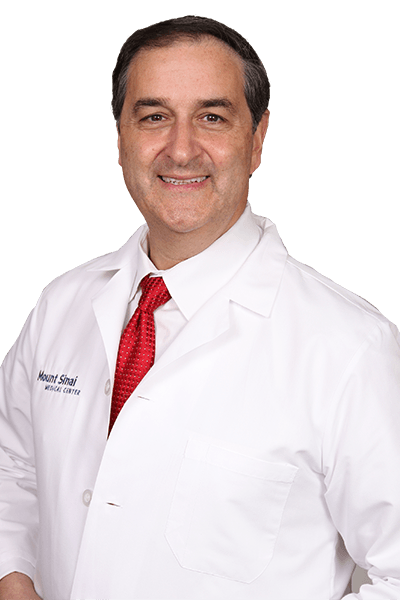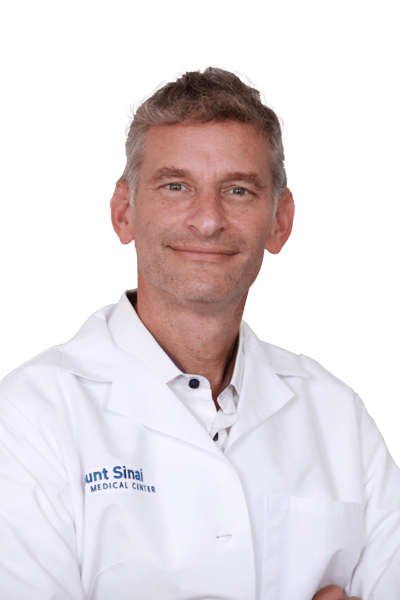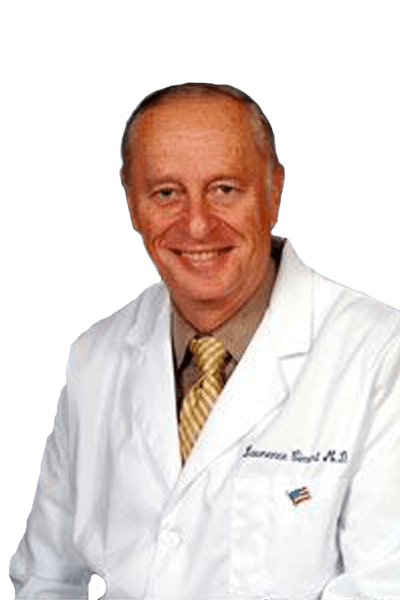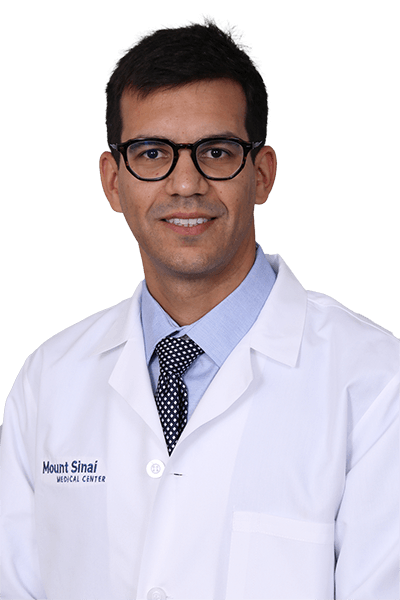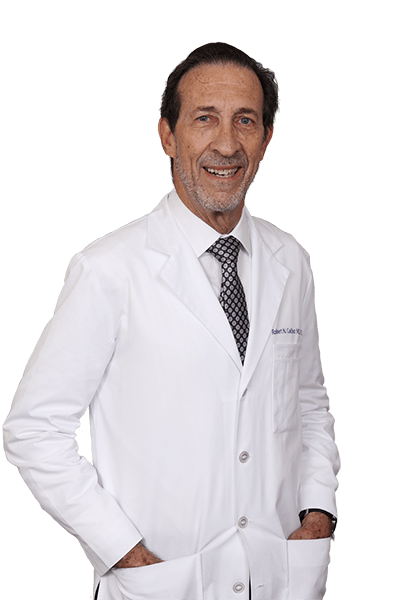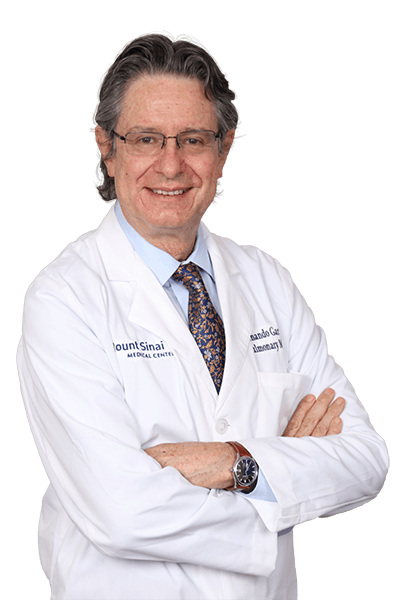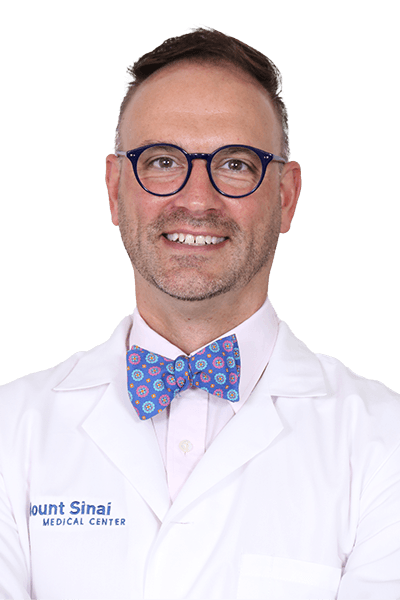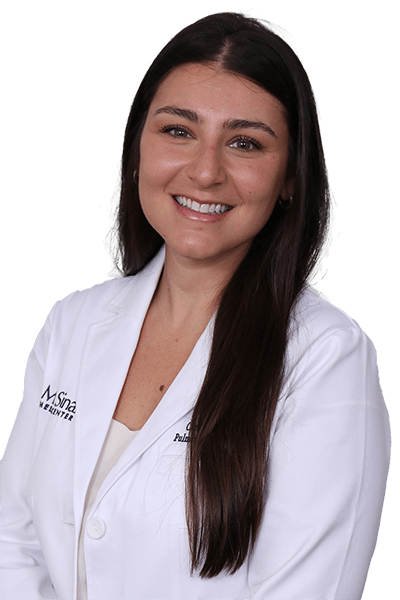What We Treat
As anyone who has ever experienced shortness of breath or difficulty breathing can imagine, lung diseases and conditions of the lungs have severe consequences on quality of life and, in some instances, can be life-threatening.
Acute Respiratory Failure
There are many factors that can lead to acute respiratory failure, which is life-threatening and requires emergent care. Acute respiratory failure may be caused by the following:
- Airway obstruction by an object (choking) or by a disease such as chronic obstructive pulmonary disease (COPD) or asthma
- Acute pulmonary edema from heart failure
- Severe injury to the lungs, spine, or brain
- Pneumonia, including COVID pneumonia
- Drug or alcohol overdose, which can also cause acute respiratory distress
Patients with acute respiratory failure are ultimately cared for in our intensive care units (ICUs), under the expert guidance of our pulmonary care team.
Asthma
People with asthma have episodes when their airways become narrow, swollen or, in some cases, produce excess mucus. These circumstances can make breathing difficult. Asthma varies in severity from patient to patient and has a range of causes. Some patients’ asthma flares up from exercise, environmental exposures, or allergies. Asthma symptoms include shortness of breath, chest pain or tightness, and coughing or wheezing. These symptoms may get worse when you’re sick and can affect sleep.
Pulmonologists at Mount Sinai Medical Center have advanced lung function testing to diagnose asthma.
Treatment
Mount Sinai’s experts provide personalized care tailored to each patient, so treatment options for asthma differ depending on the individual case. In general, though, your Mount Sinai pulmonologist will likely utilize all or some of the following approaches:
- Medications, including bronchodilators, treat the symptoms of asthma. These medications typically come in inhalers, or devices that nebulize medications directly into your lungs. Bronchodilators relax the muscles around your airways, alleviating coughing and making breathing easier.
- Mount Sinai Medical Center provides patients with cutting-edge immunotherapies. These new approaches have shown promise in easing asthma symptoms and slowing disease progression.
Chronic Obstructive Lung Disease
Chronic obstructive lung disease, also known as chronic obstructive pulmonary disease and abbreviated “COPD,” causes lung inflammation that obstructs airflow. Chronic bronchitis and emphysema are the two most common conditions that contribute to COPD. Chronic bronchitis is inflammation of the lining of the breathing (bronchial) tubes, while emphysema is a condition where the alveoli (or tiny air sacs) in the lungs are damaged, causing shortness of breath.
Patients with COPD have an increased risk of developing infections, heart problems, lung cancer, high blood pressure, and depression. COPD is almost always caused by cigarette smoking or prolonged exposure to toxic gasses or inhaled material. Because people with COPD typically smoke (or used to smoke) cigarettes, Mount Sinai Medical Center focuses heavily on smoking cessation as a preventive measure to reduce the likelihood of patients developing COPD.
Treatment
The pulmonary specialists at Mount Sinai Medical Center provide patients with advanced lung function testing to diagnose and monitor COPD. In addition, we use the newest medical management, including newer therapies. Our COPD program includes the following components:
- Smoking cessation — Smoking cessation, or quitting smoking, is an integral part of treating and preventing COPD. Quitting smoking can be difficult, but the specialists at Mount Sinai Medical Center can help you find the treatment plan that works for you. Nicotine replacement products, medications, counseling, and behavioral changes also help smokers quit the habit.
- Medication — Your Mount Sinai pulmonologists have an array of medications to choose from to treat the symptoms of COPD. Some of these medications are taken regularly as an ongoing therapy, while you may take some only when symptoms worsen. The pulmonologists at Mount Sinai Medical Center will design a treatment plan that’s right for you, using drugs like the following:
- Bronchodilators — Bronchodilators are a type of medication that typically comes in inhalers. Bronchodilators relax the muscles around your airways, alleviating coughing and making breathing easier. Bronchodilators are available in both short-acting and long-acting forms. The pulmonary specialists at Mount Sinai Medical Center have access to the newest and most effective bronchodilators with the least side effects.
- Steroids — Steroids are available as inhalers and as oral medications. Inhaled steroids can help reduce inflammation and help prevent and treat flare-ups of COPD symptoms. You may need a short course of oral steroids to treat severe COPD episodes.
- Combination inhalers — Combination inhalers include bronchodilators and corticosteroids or two different types of bronchodilators.
- Antibiotics — You may require antibiotics to treat infections such as pneumonia, influenza, and acute bronchitis, which can worsen COPD symptoms.
- Lung therapy — Lung therapies, like oxygen therapy, provide supplemental oxygen. Also, lung rehabilitation therapy can help the quality of life of patients with moderate to severe COPD.
Idiopathic Pulmonary Fibrosis and other Interstitial lung disease (ILD)
Idiopathic pulmonary fibrosis, the most common form of ILD, occurs when your lung tissue gets damaged and scarred. When this happens, the tissue thickens and loses its elasticity, making it difficult for your lungs to function properly. When pulmonary fibrosis has no known cause, we call it “idiopathic,” which means “of unknown cause.” As pulmonary fibrosis progresses, patients become more and more out of breath. While the progression and severity of symptoms varies, common symptoms include shortness of breath, a dry cough, fatigue, unexplained weight loss, and joint and muscle aches.
The pulmonary care of complex ILD patients and idiopathic pulmonary fibrosis is routinely done at Mount Sinai and consists of nearly daily conferences with multiple physicians, including radiologists, surgeons, and fellow pulmonologists. Whether a bronchoscopy, surgical procedure, or simple radiology review is done for the diagnosis, it is made on a case-by-case basis in a multidisciplinary fashion.
Treatment
Mount Sinai’s pulmonary experts provide personalized care tailored to each patient, so treatment options for idiopathic pulmonary fibrosis differ depending on the individual case. In general, though, your Mount Sinai pulmonologist will use some or all of the following:
- Medication — Our Mount Sinai pulmonologists treat idiopathic pulmonary fibrosis with the most up-to-date medications such as nintedanib and pirfenidone.
- Oxygen therapy — Your doctor may prescribe oxygen therapy, where you get extra oxygen all the time, or on an as-needed basis. While oxygen therapy does not reverse the effects of pulmonary fibrosis, it may improve your quality of life by making breathing, exercising, and sleeping easier.
- Pulmonary rehabilitation — Breathing exercises, breathing techniques, nutrition counseling, and education about your condition can improve lung function.
- Lung transplant — In some cases, your doctor may recommend a lung transplant. The team at Mount Sinai will work closely with you to refer you to a lung transplant center.
Lung Cancer
Even with dramatic reductions in cigarette smoking, lung cancer remains the second most commonly diagnosed cancer in men and women and the leading cause of cancer deaths in the United States. People who smoke have the highest risk of developing lung cancer; however, lung cancer can occur even among people who have never smoked. Symptoms include a new, worsening, or persistent cough; chest pain; shortness of breath; coughing up blood; unintended weight loss; and extreme fatigue.
Mount Sinai Medical Center’s Lung Center earned recognition as a Center of Excellence by the Lung Cancer Alliance and offers state-of-the-art diagnostic and treatment options, including minimally invasive robotic-assisted surgery and access to clinical trials unavailable at other medical institutions. Lung cancer requires a multidisciplinary team of physicians.
Mount Sinai’s multispecialty Thoracic Oncology Conference meets once a week to discuss the appropriate workup and treatment of our patients with lung cancer. This ensures that every patient with lung cancer has a robust evaluation from a multidisciplinary care team.
Diagnosis and Treatment
Mount Sinai’s team of lung cancer experts provides personalized care tailored to each patient, so treatment options for lung cancer differ, depending on the individual case. Your care team will work with you to create a care plan that may include the following diagnostic and treatment options:
- Bronchoscopy — A bronchoscopy is a procedure that is performed by advancing a scope (bronchoscope) through your mouth or nose and into your lungs.
- Navigational bronchoscopy — Pulmonologists at Mount Sinai may expedite navigational bronchoscopies, which are performed by our team of experienced thoracic surgeons, who offer patients access to one of the leading programs for this technology in Florida.
- CT scans — When we detect lung cancer early, patients often have much improved results. With this in mind, Mount Sinai offers lung cancer screening using low-dose CT scans that detect nodules, or abnormal tissue growth. We recommend lung cancer screening for patients with a long-term smoking history. If your CT scan detects a nodule, you may require a biopsy, which can be done externally through a CT scan guided approach, or internally via a bronchoscopic approach.
- Endobronchial ultrasound — An endobronchial ultrasound aids in diagnosing cancer and other respiratory disorders. This procedure allows doctors to see beyond the bronchial wall and detect diseased tissue outside the bronchial airways.
- Chemotherapy — Chemotherapy kills fast-growing cancer cells in your body. Your Mount Sinai lung cancer oncologist may prescribe chemotherapy alone or in combination with other treatments.
- Surgery — Sometimes, your doctor may recommend surgery to remove cancerous tissue. This may involve removing a segment of the lung or the entire lung. At Mount Sinai, our thoracic surgeons often use robotic-assisted surgery to remove lung cancers. In fact, Mount Sinai Medical Center was one of the first hospitals in South Florida to utilize robotic-assisted surgery. As early adopters of this technology, the Mount Sinai thoracic surgical team has performed more than 2,500 robotic-assisted surgeries since 2009, making them one of the most experienced teams in the United States.
- Immunotherapy — Immunotherapy uses your body’s natural immune system to fight cancer.
- Radiation therapy — Radiation therapy uses beams of intense energy to kill cancer cells. Radiation therapy may be used alone, or in combination with other treatments.
- Clinical trials — Mount Sinai’s Oncology Research and Fellowship Program enables you to participate in new treatment options and clinical trials for lung cancer that may not be available at other institutions.
Pulmonary Hypertension
Pulmonary hypertension is a type of high blood pressure affecting the arteries in either the right side of the heart or the lungs. Pulmonary hypertension can result in reduced blood flow to the heart and can cause the heart to work harder to pump blood throughout the body. In some cases, pulmonary hypertension is life-threatening.
Pulmonary hypertension can be difficult to diagnose since its symptoms often resemble other respiratory and heart conditions. Fortunately, Mount Sinai is home to some of the most experienced pulmonologists who are focused on pulmonary hypertension, including physicians with more than three decades of experience treating pulmonary hypertension. In addition, the pulmonologists at Mount Sinai Medical Center use the latest technologies to detect and diagnose pulmonary hypertension, including the following:
- Blood tests
- Chest X-rays
- CT scans
- MRIs
- Electrocardiograms (ECGs)
- Echocardiograms
- Pulmonary (lung) function testing
- Sleep studies
- Genetic testing
Treatment
While the main cause of pulmonary hypertension may not be cured, proper care and treatment can improve your symptoms and increase quality of life. Mount Sinai Medical Center’s team of pulmonologists has vast experience treating patients with pulmonary hypertension, including staff with over 30 years of expertise in treating complicated pulmonary hypertension cases. Your pulmonologist will work with you to design a care plan to meet your individual needs. Overall, treatment will include the following options:
- Medications — A wide range of medications are available to treat pulmonary hypertension, depending on your individual needs. Some common medications include blood thinners (anticoagulants), blood vessel dilators (vasodilators), guanylate cyclase (GSC) stimulators, and diuretics, as well as medications that widen blood vessels or increase blood flow.
- Surgery — In some cases, medication alone is not enough to treat pulmonary hypertension. In these cases, your doctor may recommend surgery. Surgical treatment for pulmonary hypertension ranges from open-heart surgery to heart or lung transplant surgery. Your care team will help you weigh the risks and benefits of such surgeries.
Pulmonary Vascular Disease, Including Pulmonary Embolism
Pulmonary vascular disease affects the blood vessels running between the lungs and heart, or the blood vessels leading toward or away from the lungs.
The heart and lungs work together to pump oxygenated blood through a network of veins (blood vessels that carry deoxygenated blood to the heart) and arteries (blood vessels that carry oxygen-rich blood to organs and tissues in the body). A pulmonary embolism is when a blockage occurs in the pulmonary arteries in your lungs, caused by blood clots, typically originating from deep veins in the legs. Pulmonary embolisms present differently, depending on the size of the blood clot, how much of your lung is affected, and whether you have underlying conditions (such as lung or heart disease). Common symptoms of pulmonary embolisms include shortness of breath, chest pain, and cough. Since these clots block blood flow to the lungs, pulmonary embolisms can be life-threatening if not detected and treated properly, making pulmonary embolisms the third leading cause of death from cardiovascular disease.
Treatment
Proper diagnosis and treatment of pulmonary embolisms lead to better survival rates, and Mount Sinai Medical Center is staffed with a Pulmonary Embolism Response Team (PERT) to respond to patients’ needs. PERT is a multidisciplinary team of physicians across different medical specialties who collaborate to rapidly diagnose, manage, and treat pulmonary embolisms. Mount Sinai Medical Center is considered a Center of Excellence for pulmonary embolism diagnosis and therapy. Our experts provide personalized care tailored to each patient, so treatment options for pulmonary vascular disease or pulmonary embolism differ depending on the individual case. Overall, the treatment options will include the following:
- Blood thinners (anticoagulants) — One of the most common medications used to treat and prevent serious complications that may arise from pulmonary embolisms are blood thinners. Blood thinners work by stopping already existing blood clots from getting bigger while preventing new clots from forming.
- Clot dissolvers (thrombolytics) — When added directly to the vein, clot dissolvers can sometimes quickly dissolve blood clots. This treatment is generally reserved for life-threatening situations.
- Blood clot removal — In some cases, doctors physically remove large clots from your lung. This procedure is usually reserved for life-threatening instances.
- Vein filter — In some cases, it may be necessary to insert a filter into the main vein that leads to your heart to prevent clots from passing to your lungs.
Sarcoidosis
Sarcoidosis causes clusters of inflammatory cells to grow in your body, most commonly in your lungs and lymph nodes. While the cause of sarcoidosis is unknown, preliminary research indicates that it might result from an immune response to environmental contaminants. There is no cure for sarcoidosis. But overall, patients with sarcoidosis respond well to treatment and, in some cases, sarcoidosis goes away on its own.
Treatment
Mount Sinai’s experts provide personalized care tailored to each patient, so treatment options for sarcoidosis differ depending on the individual case. Overall, the treatment options will include the following:
- Medications — In some cases, medications can be used to treat the symptoms of sarcoidosis. Such medications may include corticosteroids and methotrexate, which suppress the immune system.
Sleep Disorders
What does sleep have to do with pulmonary medicine? Well, many sleep disorders are caused by breathing problems. Further, sleep disorders can dramatically, negatively impact the quality or quantity of your sleep. And as most people know, lack of sleep can lead to sleep deprivation or a decline in overall health and well-being. Common symptoms of a sleep disorder include increased sleepiness during the day, the inability to stay or fall asleep (insomnia), irregular breathing while sleeping (sleep apnea), loud snoring, and irregular movements during sleep.
Diagnosis and Treatment
The Sleep Disorders Center at Mount Sinai Medical Center is staffed with experts in diagnosing and treating sleep disorders. Mount Sinai’s experts provide personalized care tailored to each patient, so treatment options for various sleep disorders differ depending on the individual case. The Sleep Disorders Center has an active sleep lab that performs diagnostic and therapeutic sleep studies (polysomnography), which can aid in the diagnosis and treatment of the following disorders:
- Obstructive, central, and mixed sleep apnea
- Snoring
- Cheyne-Stokes respiration
- Obesity hypoventilation syndrome
- Narcolepsy
- Periodic limb movements of sleep
- Parasomnias (e.g., sleepwalking and REM behavior disorder)
Treatment of sleep disorders often includes the use of noninvasive, positive pressure devices that include CPAP, BPAP, and APAP devices.
Our Physicians
- Mount Sinai Medical Center (Main Campus)
- 305.674.2055
- Mount Sinai Emergency Center, Physician Offices, Cancer Center and Diagnostic Center Aventura
- 305.692.1080
Ari J Ciment, MD
- Pulmonary
- Critical Care
- Mount Sinai Medical Center (Main Campus)
- 305.674.2121
Lawrence M Ciment, MD
- Pulmonary
- Mount Sinai Medical Center (Main Campus)
- 305.674.2121
Hernando J. Cordero, MD
- Pulmonary
- Critical Care
- Mount Sinai Medical Center (Main Campus)
- 305.674.2055
- Mount Sinai Primary & Specialty Care Coral Gables
- 305.441.0910
Robert N Galbut, MD, FCCP
- Pulmonary
- Internal Medicine
- Mount Sinai Medical Center (Main Campus)
- 305.674.2121
Hernando Garcia, MD, FCCP
- Pulmonary
- Critical Care
- Mount Sinai Medical Center (Main Campus)
- 305.674.2121
- Mount Sinai Emergency Center and Primary & Specialty Care Hialeah
- 786.584.5555
Joseph R. Paprota, MD
- Pulmonary
- Critical Care
- Mount Sinai Medical Center (Main Campus)
- 305.674.2055
- Mount Sinai Emergency Center, Physician Offices, Cancer Center and Diagnostic Center Aventura
- 305.692.1080
- Mount Sinai Specialty Care Key West I Cardiology, Urology & Vascular Care
- 305.294.8334
Carla Rosenzvit, MD
- Pulmonary
- Critical Care
- Mount Sinai Medical Center (Main Campus)
- 305.674.2055
- Mount Sinai Emergency Center and Primary & Specialty Care Hialeah
- 786.584.5555
Luis Echarte, MD
- Pulmonary
- Critical Care
- Sleep Medicine
- Sleep Disorders
- Aventura
- 305.466.0030


